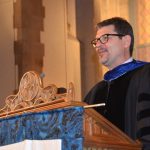August 17, 2018
 I am writing these words from the Oxford Institute for Methodist Studies, a gathering of 170 scholars from around the world who gather together once every five years to reflect on Wesleyan theology in light of the Bible and our current contexts. This year’s theme is “Thy Grace Restore, Church Revive,” which gives direction to the plenary sessions and papers. Each participant was required to write a paper and present it in a working group and enter into discussion with the other scholars. Some papers are more historical, others more contemporary, some more theological, and still others practical, yet all attempt to reflect on what it means to be the church in the Wesleyan tradition today.
I am writing these words from the Oxford Institute for Methodist Studies, a gathering of 170 scholars from around the world who gather together once every five years to reflect on Wesleyan theology in light of the Bible and our current contexts. This year’s theme is “Thy Grace Restore, Church Revive,” which gives direction to the plenary sessions and papers. Each participant was required to write a paper and present it in a working group and enter into discussion with the other scholars. Some papers are more historical, others more contemporary, some more theological, and still others practical, yet all attempt to reflect on what it means to be the church in the Wesleyan tradition today.
One of the fascinating aspects of the gathering is that participants come from a variety of contexts. There are theologians and Bible scholars from every continent, some are serving in Methodist seminaries or universities, while others come from much more secular environments. Some serve in a local church, others are academicians. There are both junior scholars and published authors. There are men and women from the global south, global north, some rural, some urban, some places where Christianity is the majority, others where it is a minority. There are places where it is growing, others where it is in decline. So this presents a wonderful opportunity to learn from brothers and sisters around the world about what it means to do theology from a Wesleyan perspective in a variety of contexts. Yet as we see all these differences, there are actually some commonalities.
For example, one friend is from Sri Lanka—Dr. Albert Jebanesan—and spoke about the challenges of training seminary students who come from non-Christian backgrounds. He shared how they were relatively recent converts to Christianity from Hindu and hadn’t grown up going to Sunday school, Vacation Bible Study or youth group, so he had to fill in a lot of content of biblical content, church history and basic doctrine. In spite of the different context, his story resonated with my experience teaching seminary and university students in the US. Although many of my former students have grown up in the church, they did not always have strong backgrounds in Bible and theology.
In another example, Rev. Joan Delsol Meade, a Methodist minister in a bicultural context where there is both a Dutch and French country on the small Caribbean island of St. Maarten. She wrestles with what it means to have a Christian school in the instructional language of English in the midst of a diverse cultural and linguistic environment. Although a very different context, I can identify with doing multicultural ministry in seminary classrooms where students come from a variety of countries and sub-cultures, who are all preparing for ministry in a global church. In these cases, it is the rich cultural exchange that is every bit as valuable as the actual class content. These are just two examples from my working group, but I could share many others from the United Kingdom, Korea, India or several other examples represented at the Oxford Institute.
During this experience at the Oxford Institute I have learned—again—that no one person or one place has the final say. That all of us are negotiating and discerning what it means to be faithful in our context. Yet our common Wesleyan roots keeps us from falling into a complete relativism without any unity or universal truth. There is a common thread of sharing the Gospel as interpreted through Scripture, tradition, reason and experience, and applied in a specific time and place. Yet the experiences of others both encourage and enrich us along the journey.
